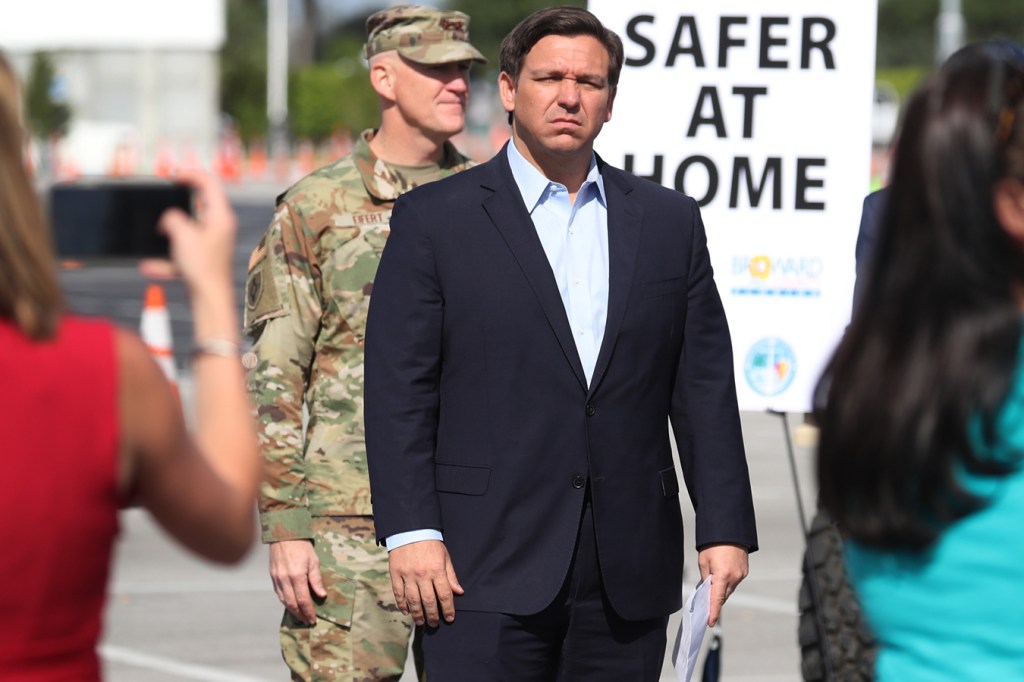With pressure mounting from public health officials and political leaders nationwide, Florida Gov. Ron DeSantis on Wednesday reversed course and ordered residents across the state to stay at home to help reduce the toll of the coronavirus pandemic.
The order takes effect at 12:01 a.m. Friday, April 3.
Florida joins more than 30 other states and the District of Columbia in moves that have similarly restricted residents and businesses. DeSantis’ decision came as Texas and Pennsylvania took similar action.
For more than a week, DeSantis said a statewide order was unnecessary because many parts of the state ― particularly large swaths of central and northern Florida — had few if any cases. When asked about the issue Tuesday, the governor said he wasn’t issuing an order because he had not been told by the White House coronavirus task force that an order was necessary.
DeSantis spoke to President Donald Trump about the outbreak before his announcement.
DeSantis said what changed his mind was Trump’s call on Sunday for the national social-distancing guidelines to be extended through April because of mathematical models showing how death tolls would soar if the population did not observe the recommended public health guidelines for staying at home. Trump has not issued a national stay-at-home order.
“That was a signal,” DeSantis said. “It’s a very serious situation.”
Scott Gottlieb, a former Food and Drug Administration commissioner under Trump who has been outspoken on the need for officials to act to quell the outbreak, said in a tweet:
“New actions just announced by Florida’s Governor to implement tougher mitigation will hopefully reduce spread of #COVID19 in state. Florida is also testing much less than other states and needs more screening capacity to keep up with its expanding epidemic.”
Before DeSantis reversed course, Gottlieb said in an interview with CNBC earlier Wednesday that Florida and Texas are “wild card” states that could leave the United States with more deaths from the coronavirus if they don’t take tougher actions.
Many public health experts had strongly criticized Florida officials for allowing large spring-break beach gatherings in mid-March, raising concerns that the parties could be spreading COVID-19, the disease caused by the coronavirus. Even more recently, large beach and sandbar parties in late March have brought condemnation.
DeSantis resisted closing all beaches via a state decree, but most counties in Florida have now done so on their own.
The Florida order is less restrictive than that of some other states. In addition to common exceptions for errands deemed essential, such as grocery shopping and picking up prescriptions, it allows people to still attend religious services at churches and synagogues and take care of relatives and their pets.
The Florida governor had already ordered nightclubs and restaurant dining rooms across the state to close and restricted gatherings of 10 or more people on beaches. The state had already closed all schools.
Several of Florida’s largest cities and counties — including all of South Florida, which on Wednesday afternoon had about 3,900 COVID-19 cases — had earlier ordered residents to stay at home.
Public health and political leaders praised DeSantis’ order Wednesday, although some said he should have acted earlier.
“Thank you, Governor, for making the right call,” said Florida Agriculture Commissioner Nikki Fried, a statewide elected member of the Florida Cabinet. She noted she asked DeSantis to issue the order on March 20 to save lives.
As of Tuesday morning, Florida had about 7,000 confirmed cases of COVID-19, nearly 900 hospitalizations and at least 87 deaths. More than 60% of the cases were in South Florida.







